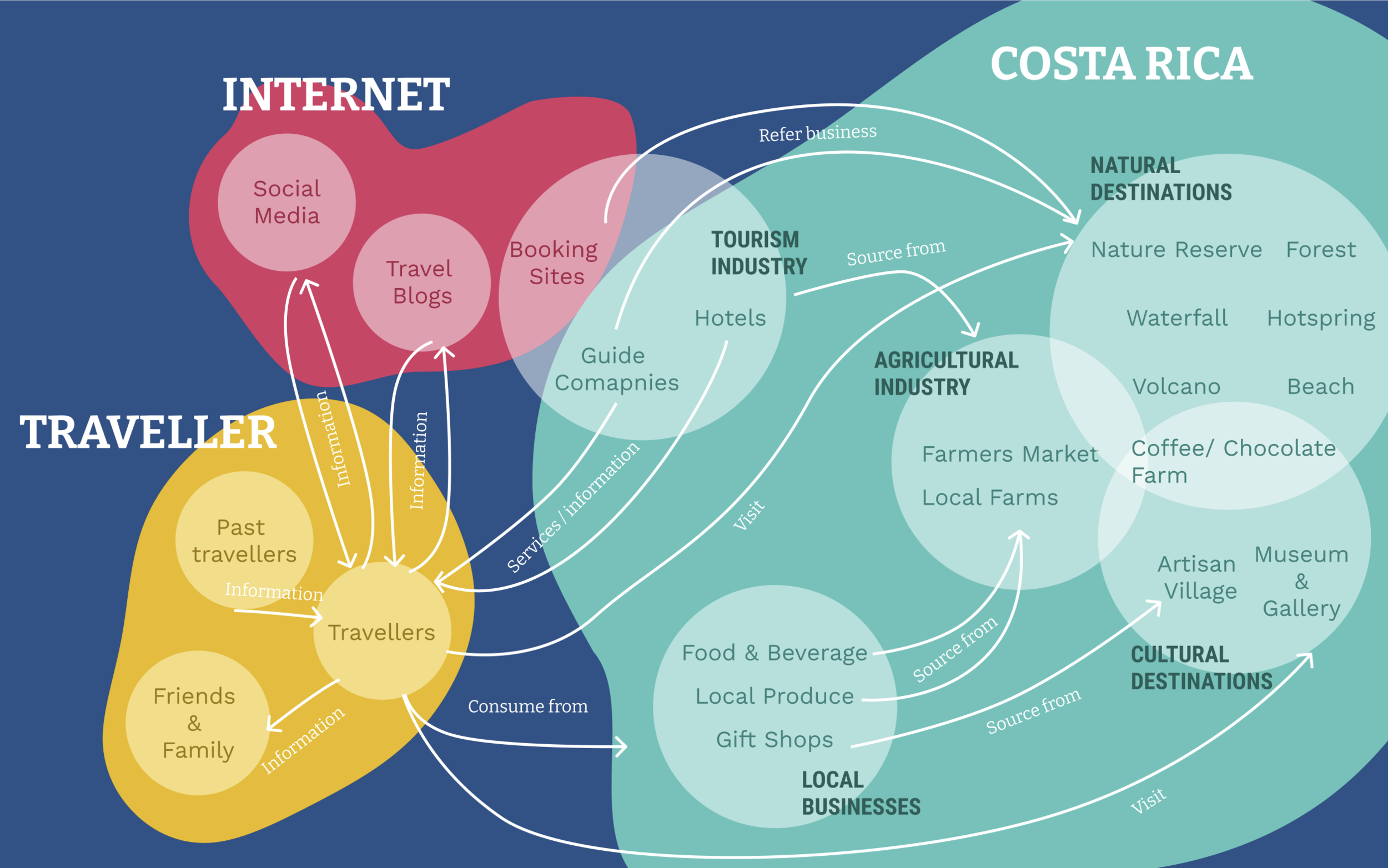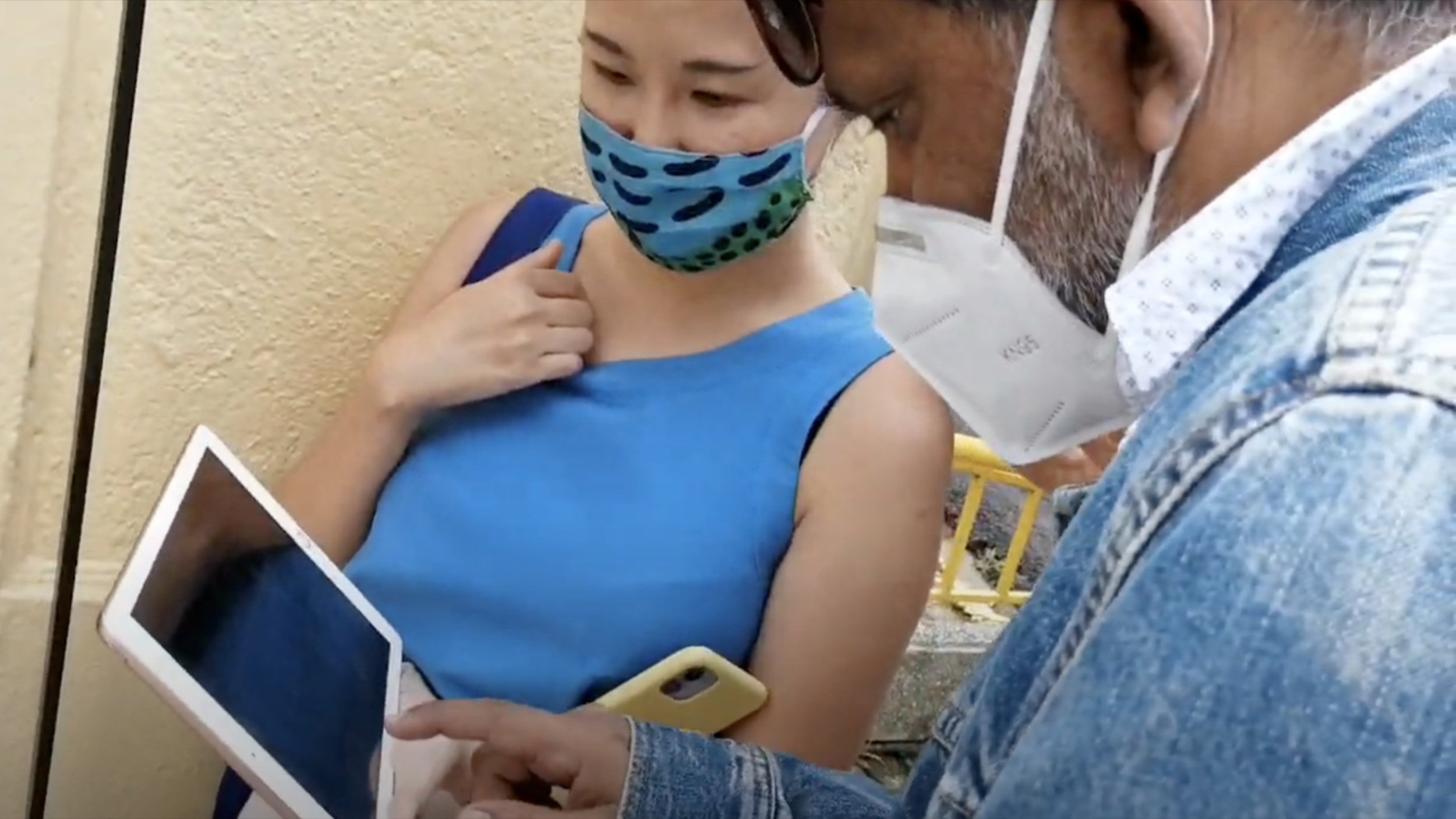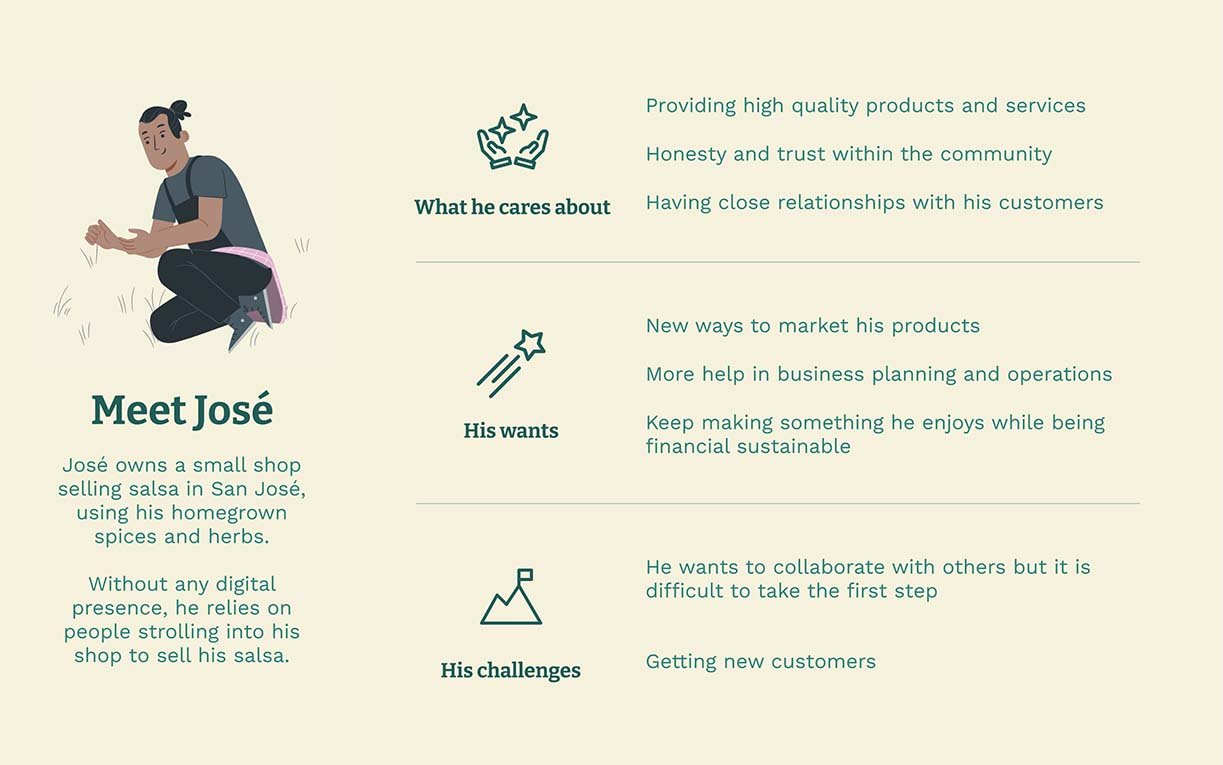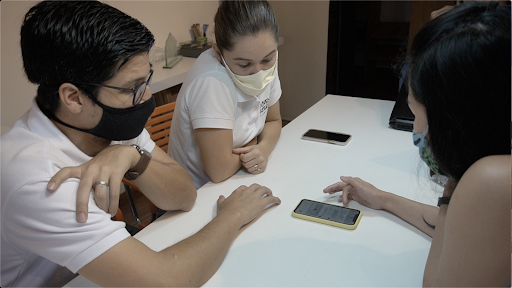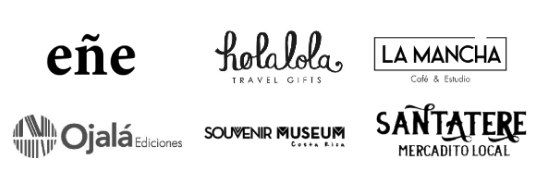Soulvenir
Putting the Soul in Souvenirs
Soulvenir is a service designed to connect travellers and local makers for authentic experiences through local products while enabling collaborations within communities in Costa Rica.
Project Background:
Our design challenge was to explore how tourism could become more resilient and life-centred while simultaneously expanding the economic growth of Costa Rica. This project was developed over three weeks with Martin Altanie (Indonesia), Alejandro Segura (Costa Rica), Ooi Shin (Malaysia) during the service design course at CIID.
Design Opportunity
Best-known for its nature, Costa Rica is a culturally rich and diverse country with a thriving maker culture. The Central Valley region, home to about 70% of the population is often overlooked by travellers as a transit stop. The current tourism model in Costa Rica relies heavily on nature-based tourism with limited means of enabling generative tourism.
What if we could reimagine tourism by enabling deeper connections between travellers and local maker communities in Costa Rica?
How does it work?
Soulvenir is a service that connects local makers and travellers through authentic experiences and products, while providing collaboration opportunities for local businesses.
It suggests tailored activities for travellers based on their interests hosted by local makers and their connections in the Compa (‘friends’ in Costa Rican Spanish) Network. Locally produced souvenirs are presented at the end of each experience. Soulvenir enables cross-cultural (travellers and local) and multi-disciplinary (makers to makers) exchange that strengthens resilience within the tourism ecosystem.
How did we get there?
Ecosystem Mapping
Through mapping out the value chain within the tourism ecosystem in Costa Rica in the early stage of our research process, we validated our assumptions of the interactions between local businesses and travellers. We identified some focus areas for further exploration:
Create flows between different actors and improve resilience of the system
Extend Costa Rica’s current nature-based tourism to other untapped experiential experiences
Desk Research
We reviewed publications on the impact of COVID-19 on tourism and identified three opportunity areas based on UN’s recommendations:
Embrace local values
Advance digitalisation of the tourism ecosystem
Promote coordination and partnerships to build resilience
Intercept Interview
We hit the streets of San José and found one tourist (!) after three hours. We did some quick card sorting activities to understand his expectations and experience as a tourist in Costa Rica and learnt that he was largely unaware of the maker culture in Costa Rica.
It was challenging given this project took place in the midst of a global pandemic with strict COVID travel restrictions (Oct 2020).
In-depth Interviews
Over nine hours of in-depth interviews and site visits were conducted with travellers, local businesses, and tourism experts in Costa Rica. Local artisans and makers were passionate about the work they do and were eager to share their culture. One thing that stood out during our site visits was that local makers all have other makers’ products in their stores. This inspired us to focus on the hyperconnectivity within the Costa Rican local network as our reframed design challenge.

Insights
Souvenirs extend stories of people beyond space and time
“I hope every piece here tells or creates a story because that’s what travelling is”
— Local artist & souvenir shop founder
Costa Rican businesses thrive on word-of-mouth recommendations
“Costa Rica es una Finca” (Costa Rica is a Farm)
Trust is crucial in Costa Rica’s hyperconnected communities
“Small local businesses empathise with each other and try to keep each other afloat”
— Gift book company director
Personas
We consolidated our findings from interviews into personas to map out values, challenges, and wants for travellers and local makers.
Travellers value authenticity, stories, and memories and want:
Keepsakes with an origin and stories behind them
Genuine connections with locals
Local makers value solidarity, sharing stories of Costa Rica, and good relationships with customers and want:
New ways to market products
Help in business planning and operations
Honing their crafts in a financially sustainable way
Personalised Experiences
Travellers rely on contextual information (e.g. stories and anecdotes) when looking for authentic experience recommendation.
We also mapped out different stages of a travel journey for travellers and found that:
Most of the digital service platforms are segregated and focused on a specific stage of the travel journey;
Souvenirs are on most travellers’ travel agendas as they serve as reminders of the travel experience…
…yet souvenir purchase mostly happens when travellers are at a lower emotional state in a travel journey and are often seen as a chore, which reduces the significance of the object and the high state of the travel experiences
What opportunity areas did we identify?
Connect with Locals
Casual encounters with locals make travel experience feel personal and authentic.
Brainstorming
We brainstormed on a list of prompts and abstracted ideas into different themes for further exploration. The two themes that intrigued us were:
Extending the travel experience through souvenirs to before and after the trip
Showing the lives of Costa Rican people through daily objects and experiences
Innovate Businesses
With Costa Rica’s hyperconnected network, local businesses want to form partnerships but there isn’t an easy way to do so.

Design Opportunity
What if we could extend authentic travel experience in Costa Rica through time and space?
Prototyping
Exploring how we could materialise our concepts into something tangible, we defined the key features for our service and created a service blueprint and created the core interactions of key features using paper prototype.
Through co-creation and testing, the paper prototypes were updated to wireframes, and eventually high fidelity prototypes. The final prototype was created using Figma and Origami Studio.
Co-creation & Testing
We conducted six hours of co-creation and testing sessions involving a traveler, a local maker, and two subject matter experts. Through activities like Think Aloud, Roleplaying, and Contextualizing, we gained insights into how touchpoints in the service align with users' motivations and expectations.
Local makers were particularly excited about the prospects of the positive externalities generated through communal collaboration. As the business model in Costa Rica is still very much brick and mortar, some noted that this service would help them rethink how to digitalise their current businesses to connect better with customers (something they need help with). Local artisans noted that they often feel that travellers and tourists do not respect their space and act in a way that is disrespectful.
‘This really made me think about how I can partner with other businesses to create something new together.’
— Local Maker
How did these feedback drive our final concept?
Based on the feedback from the co-creation and testing sessions, we added a screening function for local makers to filter out travellers they deem as incompatible, so travellers will not be able to connect with them unless the request is approved by makers.
To provide more support for local businesses, we added an insights and analytics section for local makers, as well as offline workshops for ongoing training and development.
What more would you have explored if you had more time?
Given the time constraint of three weeks and COVID-19 related travel restrictions, we would have liked to test with more travellers.
Potential areas to explore:
Spanish version for local makers and intermediary translation services during the experience
Collaborate with Souvenir Museum for a local artisan outreach programme
Develop a feasible business model that is fair amongst local collaborators
Explore possibilities for small group travelling
Virtual experiences in case of future travel restrictions
Special thanks to everyone who contributed to our project
Priscilla Aguirre, Thikshan Arulampalam, Alejandro Castro, Ana Castro, Claudio Corrales, Ubaldo Andrea Desiato, Anna Hartly, Alberto Font, Matthew Giffen, Juan José Bolaños Herrera, Melissa Jiménez, Michelle Kwok, Simona Maschi, Mónica Mendoza, Stephanie Monterrosa, Yara Mourelo, Lidia Sancho, Liliana Tagini, Stephanie Yong



